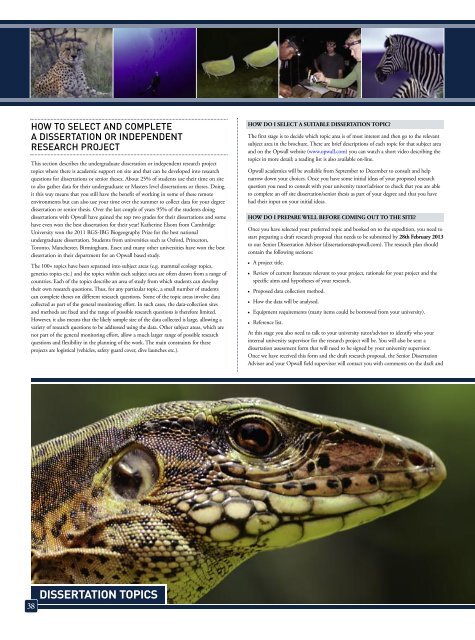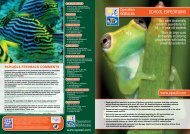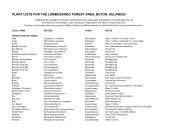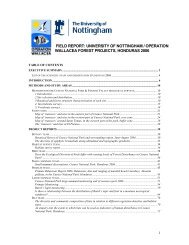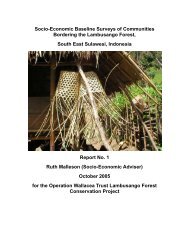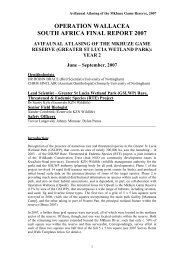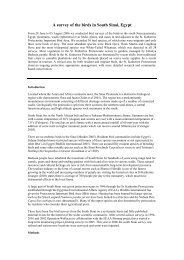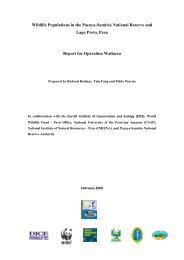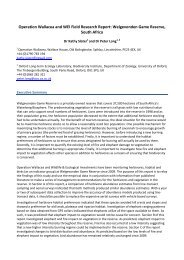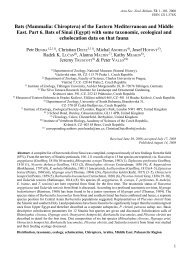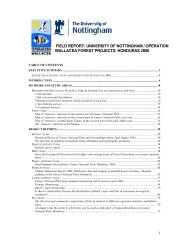Download the 2013 programme - Operation Wallacea
Download the 2013 programme - Operation Wallacea
Download the 2013 programme - Operation Wallacea
Create successful ePaper yourself
Turn your PDF publications into a flip-book with our unique Google optimized e-Paper software.
HOW TO SELECT AND COMPLETE<br />
A DISSERTATION OR INDEPENDENT<br />
RESEARCH PROJECT<br />
This section describes <strong>the</strong> undergraduate dissertation or independent research project<br />
topics where <strong>the</strong>re is academic support on site and that can be developed into research<br />
questions for dissertations or senior <strong>the</strong>ses. About 25% of students use <strong>the</strong>ir time on site<br />
to also ga<strong>the</strong>r data for <strong>the</strong>ir undergraduate or Masters level dissertations or <strong>the</strong>ses. Doing<br />
it this way means that you still have <strong>the</strong> benefit of working in some of <strong>the</strong>se remote<br />
environments but can also use your time over <strong>the</strong> summer to collect data for your degree<br />
dissertation or senior <strong>the</strong>sis. Over <strong>the</strong> last couple of years 95% of <strong>the</strong> students doing<br />
dissertations with Opwall have gained <strong>the</strong> top two grades for <strong>the</strong>ir dissertations and some<br />
have even won <strong>the</strong> best dissertation for <strong>the</strong>ir year! Ka<strong>the</strong>rine Elsom from Cambridge<br />
University won <strong>the</strong> 2011 RGS-IBG Biogeography Prize for <strong>the</strong> best national<br />
undergraduate dissertation. Students from universities such as Oxford, Princeton,<br />
Toronto, Manchester, Birmingham, Essex and many o<strong>the</strong>r universities have won <strong>the</strong> best<br />
dissertation in <strong>the</strong>ir department for an Opwall based study.<br />
The 100+ topics have been separated into subject areas (e.g. mammal ecology topics,<br />
genetics topics etc.) and <strong>the</strong> topics within each subject area are often drawn from a range of<br />
countries. Each of <strong>the</strong> topics describe an area of study from which students can develop<br />
<strong>the</strong>ir own research questions. Thus, for any particular topic, a small number of students<br />
can complete <strong>the</strong>ses on different research questions. Some of <strong>the</strong> topic areas involve data<br />
collected as part of <strong>the</strong> general monitoring effort. In such cases, <strong>the</strong> data-collection sites<br />
and methods are fixed and <strong>the</strong> range of possible research questions is <strong>the</strong>refore limited.<br />
However, it also means that <strong>the</strong> likely sample size of <strong>the</strong> data collected is large, allowing a<br />
variety of research questions to be addressed using <strong>the</strong> data. O<strong>the</strong>r subject areas, which are<br />
not part of <strong>the</strong> general monitoring effort, allow a much larger range of possible research<br />
questions and flexibility in <strong>the</strong> planning of <strong>the</strong> work. The main constraints for <strong>the</strong>se<br />
projects are logistical (vehicles, safety guard cover, dive launches etc.).<br />
38<br />
DISSERTATION TOPICS<br />
HOW DO I SELECT A SUITABLE DISSERTATION TOPIC?<br />
The first stage is to decide which topic area is of most interest and <strong>the</strong>n go to <strong>the</strong> relevant<br />
subject area in <strong>the</strong> brochure. There are brief descriptions of each topic for that subject area<br />
and on <strong>the</strong> Opwall website (www.opwall.com) you can watch a short video describing <strong>the</strong><br />
topics in more detail; a reading list is also available on-line.<br />
Opwall academics will be available from September to December to consult and help<br />
narrow down your choices. Once you have some initial ideas of your proposed research<br />
question you need to consult with your university tutor/advisor to check that you are able<br />
to complete an off site dissertation/senior <strong>the</strong>sis as part of your degree and that you have<br />
had <strong>the</strong>ir input on your initial ideas.<br />
HOW DO I PREPARE WELL BEFORE COMING OUT TO THE SITE?<br />
Once you have selected your preferred topic and booked on to <strong>the</strong> expedition, you need to<br />
start preparing a draft research proposal that needs to be submitted by 28th February <strong>2013</strong><br />
to our Senior Dissertation Advisor (dissertations@opwall.com). The research plan should<br />
contain <strong>the</strong> following sections:<br />
● A project title.<br />
● Review of current literature relevant to your project, rationale for your project and <strong>the</strong><br />
specific aims and hypo<strong>the</strong>ses of your research.<br />
● Proposed data collection method.<br />
● How <strong>the</strong> data will be analysed.<br />
● Equipment requirements (many items could be borrowed from your university).<br />
● Reference list.<br />
At this stage you also need to talk to your university tutor/advisor to identify who your<br />
internal university supervisor for <strong>the</strong> research project will be. You will also be sent a<br />
dissertation assessment form that will need to be signed by your university supervisor.<br />
Once we have received this form and <strong>the</strong> draft research proposal, <strong>the</strong> Senior Dissertation<br />
Advisor and your Opwall field supervisor will contact you with comments on <strong>the</strong> draft and


